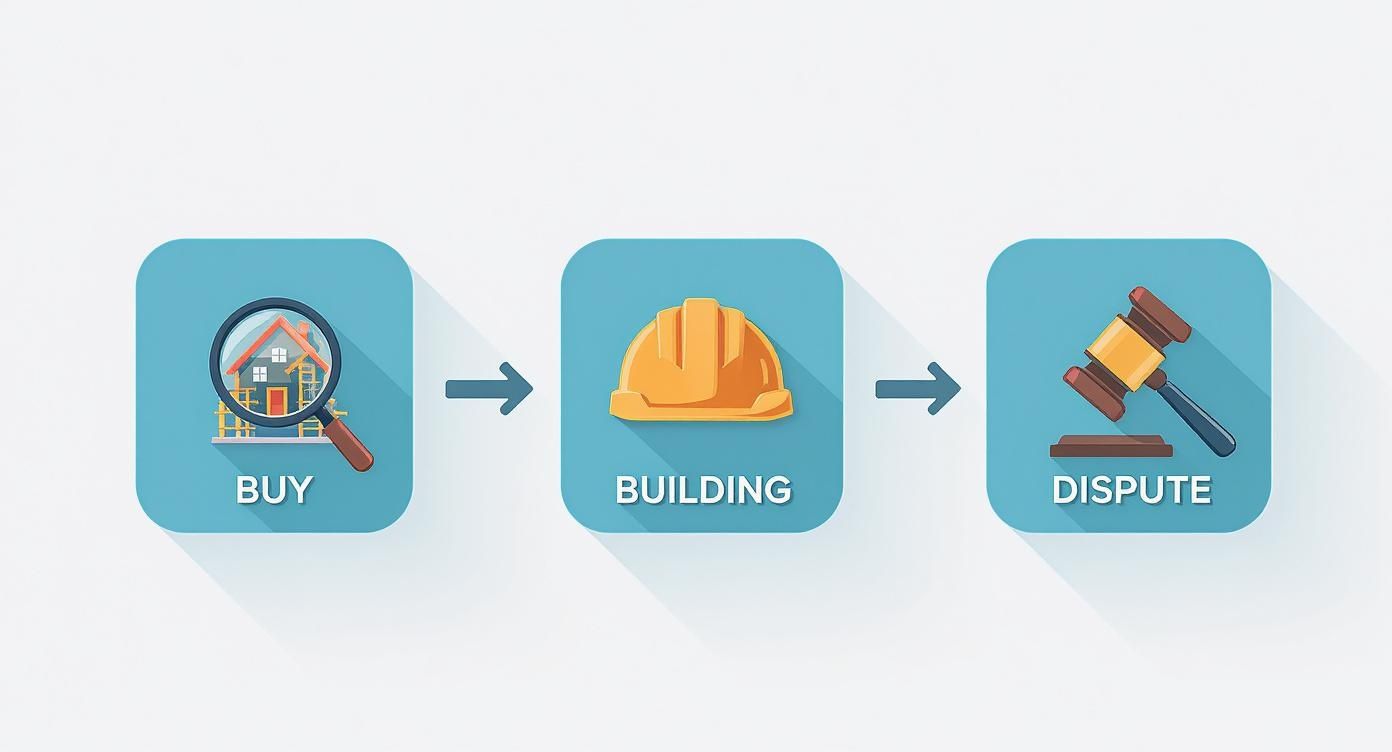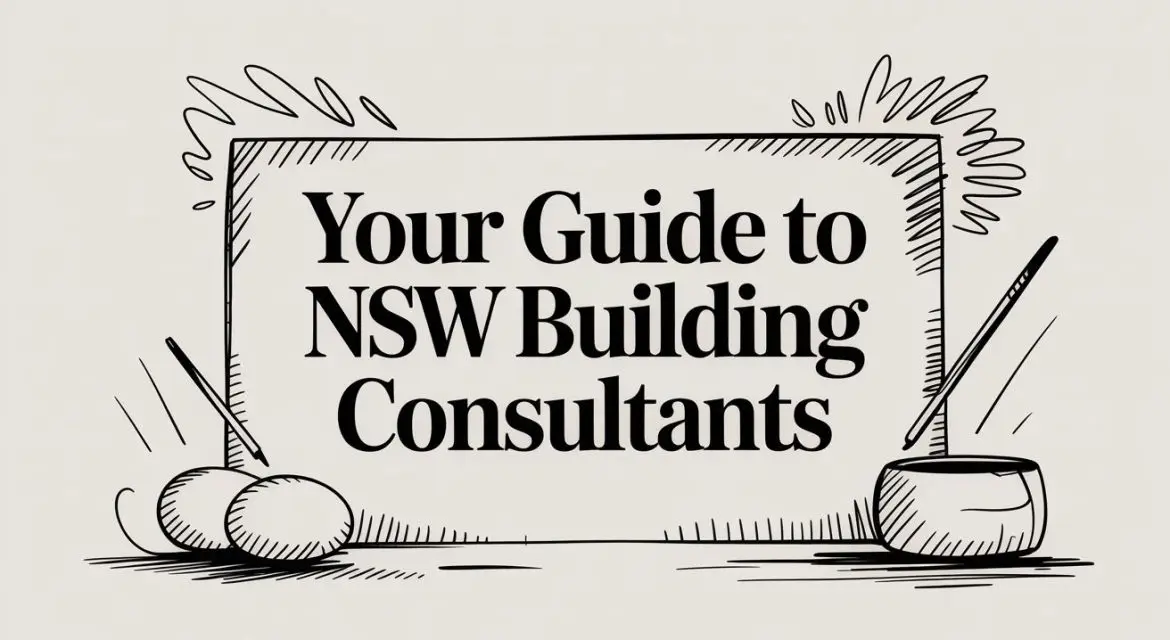Think of a building consultant as a 'building detective' for your property. They're the independent expert you call in when you need more than just a quick look-over. They provide a much deeper level of analysis and strategic advice on complex construction issues, digging down to diagnose the root cause of a problem and map out the best way to fix it.
Ultimately, their job is to protect your interests with an unbiased, evidence-based assessment.
Understanding the Role of Building Consultants

Here’s a good way to look at it: a builder is like a surgeon, focused on the hands-on work of building or repairing. A building consultant, on the other hand, is the specialist diagnostician—the expert you bring in to figure out exactly what’s wrong, why it happened, and what the most effective "treatment" is.
In the complex world of NSW property, they are your independent advisors. Their loyalty isn't to a builder or a particular outcome; it's to the facts. They provide the clarity you need to make smart, informed decisions, whether you're buying a home, running a strata property, or stuck in a frustrating building dispute.
The Key Difference Unpacked
Unlike a contractor or tradie whose main job is to get the work done, a building consultant’s real value is in their objective expertise. They don’t have a vested interest in pushing one repair method over another.
Instead, their role is to assess the situation against the National Construction Code, Australian Standards, and the manufacturer's own specifications. This allows them to give you a clear, impartial report on what's actually going on. That professional detachment is absolutely vital, especially in legal disputes where rock-solid, unbiased evidence is everything.
Building consultants are an essential part of the building construction industry, offering their specialised know-how at every stage, from the initial plans right through to analysing defects after the job is finished. Their work is key to upholding quality standards and sorting out conflicts before they escalate.
A great building consultant translates complex construction problems into a clear, actionable strategy. They cut through the noise of conflicting opinions to give you a definitive path forward, backed by evidence and decades of practical experience.
When Is a Consultant Necessary?
You don’t need to call in a consultant for every minor crack or leaky tap. But when the stakes are high, their expertise becomes essential. You should seriously consider engaging building consultants when:
- You're heading towards a legal dispute at the NSW Civil and Administrative Tribunal (NCAT).
- You need to properly document extensive or complicated building defects in a new build or renovation.
- You need an independent, expert opinion for your pre-purchase due diligence on a high-value or complex property.
- A strata committee needs a comprehensive defect report and a long-term maintenance plan.
In these moments, their ability to produce detailed, compliant reports turns confusing situations into clear ones. It gives you the leverage you need to negotiate from a position of strength or to present a robust case in a formal setting like NCAT.
Now that you have a better feel for their role, it's easier to see the immense value they bring. You can see how Awesim's team of professional building consultants and engineers in Sydney puts these principles into practice for every client.
The Core Services of a Building Consultant

A professional building consultant brings a specialised set of services to the table, each one designed to give you clarity, hard evidence, and a strategic edge. These aren’t your average inspections; they're deep, forensic investigations that lay the groundwork for smart property decisions and winning dispute resolutions.
Think of these services like the tools a specialist doctor uses. For a routine check-up, a simple once-over might be enough. But when you’re dealing with something serious, you need an MRI or a detailed biopsy to get to the truth. A consultant’s services are the property equivalent, delivering a deep, factual analysis of its health.
Let's unpack the three main services you'll likely need.
Expert Witness Reports for NCAT and Court
An Expert Witness Report is the absolute backbone of any formal building dispute in NSW. It's a meticulously crafted document, prepared specifically for legal settings like the NSW Civil and Administrative Tribunal (NCAT) or the courts.
Its job is to provide an independent, unbiased, and expert opinion on building defects, compliance breaches, or shoddy workmanship. This isn’t just a list of what’s wrong; it's a formal statement that has to follow strict legal rules to even be considered as evidence.
Crucially, the consultant preparing the report is there to assist the Tribunal, not to be a cheerleader for the person who hired them. Their duty is to the facts, providing a clear, evidence-based assessment that helps the Tribunal cut through the noise and understand the technical side of the dispute.
A powerful Expert Witness Report does more than just list defects. It explains why something is a defect, points to the exact clause in the Australian Standards or National Construction Code that's been breached, and lays out a clear, costed solution.
This level of detail is non-negotiable. Say a homeowner finds their brand-new bathroom is leaking everywhere. A consultant’s report will provide the technical proof that the builder’s waterproofing was non-compliant, giving their NCAT claim the solid foundation it needs to succeed.
Scott Schedules for Organised Dispute Resolution
When a dispute involves a whole laundry list of defects, a Scott Schedule becomes your best friend. This is a special kind of document, usually a table, that methodically lists every single disputed item in a building claim.
It’s designed to bring order to the chaos. Instead of a messy argument over dozens of problems, the Scott Schedule structures the dispute so that everyone—you, the other party, and the Tribunal—can tackle each issue one by one.
To give you a clearer picture, here’s a quick summary of the main services and when you might need them.
Core Building Consultant Services at a Glance
| Service Type | Primary Purpose | When It's Needed |
|---|---|---|
| Expert Witness Report | To provide impartial, evidence-based technical opinion for legal proceedings. | Building disputes heading to NCAT or Court. |
| Scott Schedule | To organise and itemise multiple defects in a dispute for clarity and efficiency. | Complex disputes with many claims, often required by NCAT. |
| In-Depth Inspection | To diagnose the root cause of complex building problems or for due diligence. | Pre-purchase, new build handover, strata maintenance, or investigating persistent defects. |
A Scott Schedule typically includes columns for:
- Item Number: A unique ID for each defect.
- Description of Defect: A clear explanation of the problem.
- Claimant's Cost to Rectify: What you estimate the fix will cost.
- Respondent's Position: The builder’s response (e.g., they agree, deny it, or offer another solution).
- Respondent's Cost to Rectify: The builder's own cost estimate for the repair.
This structured approach forces everyone to be specific and helps zero in on the real points of disagreement. It’s an essential document for keeping NCAT proceedings on track and making sure nothing gets overlooked.
In-Depth Building Inspections
While most people think of inspections in the context of buying a house, a building consultant’s inspection goes miles deeper than a standard pre-purchase report. These are diagnostic deep dives aimed at uncovering the root cause of complex or persistent problems.
Whether it’s for pre-purchase due diligence, assessing defects in a new build, or creating a long-term maintenance plan for a strata building, a consultant's approach is forensic. They aren’t just looking for the "what" (like a crack in a wall) but the "why" (like foundation movement, a missing structural support, or thermal expansion issues).
These inspections are vital for managing risk, especially as the construction industry continues to boom. With total construction work in Australia projected to hit $334 billion in the 2025 financial year, the need for expert oversight to catch issues early has never been greater. You can read more about this construction market recovery to get a sense of where the industry is heading.
Ultimately, these core services arm property owners with factual, credible, and actionable intelligence. They swap guesswork for evidence, giving you the leverage you need to negotiate effectively, make informed decisions, or build an undeniable case in a formal dispute. This is what sets a true building consultant apart.
The Critical Times You Need a Building Consultant on Your Team
Knowing when to call in an expert isn’t just a good idea—it can be the one decision that saves you from a complete financial and emotional nightmare. There are certain moments in the property journey that are just too high-stakes for guesswork. These are the non-negotiable times when you absolutely need the sharp, unbiased eye of a professional building consultant.
Bringing in an expert isn't a sign of weakness; it’s a strategic move to get certainty. Think of it this way: you wouldn't try to self-diagnose a serious medical condition. You’d go to a specialist. A building consultant is that specialist for your property, giving you a clear diagnosis and a proven path forward exactly when you need it most.
Let's walk through the key moments when hiring a building consultant is a must.
Before You Sign on the Dotted Line
The most common—and arguably the most critical—time to get a consultant involved is before you buy a property. A standard pre-purchase inspection might pick up on cosmetic issues, but a consultant’s deep-dive, forensic approach is designed to uncover the hidden, structural time bombs that can lead to six-figure repair bills later on.
Picture this: an excited buyer, keen to lock in their dream home, gets a basic report that glosses over subtle signs of foundation subsidence. Six months after moving in, major cracks start appearing, and suddenly they're staring down the barrel of a $120,000 underpinning job.
Now, imagine a savvier buyer who hires a consultant. That consultant spots the exact same signs. Armed with a detailed report, the buyer confidently negotiates $50,000 off the asking price, going into the purchase with their eyes wide open about the work needed. A consultant's report is powerful ammunition for negotiation and gives you the peace of mind that you're making a solid investment. A huge part of this process is the final inspection before settlement, which is your last chance to catch any issues.
When Defects Start Popping Up in Your New Build
You’ve finally got the keys to your brand-new home, but the dream quickly starts to fade as defects begin to show up. This is a crucial moment. You need to document these problems correctly from day one to hold your builder accountable.
A building consultant will give you an objective, evidence-based defect report that catalogues every single issue, from small cosmetic flaws to serious breaches of Australian Standards. This isn't just a simple list of complaints; it's a formal, professional document you can take to your builder or use as hard evidence if the dispute escalates.
Without an expert defect report, your complaints are just opinions. With one, they become undeniable facts backed by the National Construction Code.
When a Dispute is Headed for NCAT
If you're locked in a building dispute that you can’t resolve directly, the next stop is often the NSW Civil and Administrative Tribunal (NCAT). The moment NCAT is mentioned, it's a massive red flag that you need to get a building consultant on your side, immediately.
Trying to navigate NCAT without an Expert Witness Report is like showing up to court without a lawyer—you’re setting yourself up to fail. The Tribunal depends almost entirely on the independent, unbiased assessments of qualified experts to make its decisions.
A consultant’s report will:
- Pinpoint every defect or instance of non-compliant work.
- Reference the specific clauses in the Building Code of Australia or relevant standards that have been broken.
- Provide a detailed and fully-costed scope of works for how to fix everything properly.
This level of professional documentation turns your case from a "he said, she said" argument into a powerful, evidence-backed claim. It gives the Tribunal the technical clarity it needs to issue a fair and binding order. In a construction industry where activity grew 4.7% year-on-year but is also facing major labour shortages, the risk of defects is higher than ever, making this independent oversight essential.
What to Expect: Your Journey With a Building Consultant, Step by Step
Hiring a building consultant for the first time can feel a bit daunting, but it’s actually a very clear, methodical process. Knowing what happens from that first phone call to getting the final report in your hands helps take the mystery out of it all. It also lets you know exactly what’s needed from you at each stage.
Let’s break down how we build a case, turning your concerns into a rock-solid, evidence-based document.
This visual shows the common triggers—buying, building, or disputes—that often start the journey with a building consultant.

Each of these moments calls for a different game plan, but they all kick off with the same core need: expert clarity.
Stage One: The Initial Consultation
It all starts with a conversation. This first chat is where you lay out your situation—whether it's a nagging feeling about a property you want to buy, a growing list of defects in your new build, or a dispute that’s heading towards NCAT. The consultant will listen and then ask very specific questions to get the full picture.
To make the most of this, have any relevant documents ready. Think building contracts, architectural plans, or emails you’ve sent to your builder. To make things official, the relationship often kicks off with a clear consulting agreement template tailored for New South Wales that details exactly what work will be done and what you'll receive.
Stage Two: The On-Site Inspection
This is where a consultant’s real-world, hands-on experience shines. An inspection isn't just a quick walkthrough; it's a forensic investigation. The consultant will meticulously go over every area of concern, taking detailed notes and capturing hundreds of high-resolution photos. These photos become the crucial evidence backing up the report.
During the inspection, every observation is checked against a strict set of benchmarks:
- The National Construction Code (NCC)
- Relevant Australian Standards
- The manufacturer's own installation guidelines for specific products
This methodical approach ensures that every finding is based on industry regulations and facts, not just someone's opinion.
Stage Three: Analysis and Report Drafting
Once the site work is done, the consultant heads back to the office for the analysis and drafting phase. This is easily the most time-consuming part of the job. It involves piecing together all the evidence, analysing technical data, and writing the formal report.
An NCAT-compliant Expert Witness Report is constructed with surgical precision. Each claim must be supported by photographic evidence, a clear reference to a specific standard or code, and a reasoned explanation of why it constitutes a defect.
The report is structured deliberately, designed from the ground up to hold up under legal scrutiny. The consultant carefully builds the argument, making sure the final document is logical, clear, and virtually impossible to pull apart. This isn't just a report; it's a powerful tool built to withstand cross-examination.
Stage Four: Final Delivery and Strategic Advice
Finally, you get the completed report. But a good consultant won’t just email you a PDF and call it a day. They’ll take the time to walk you through their findings, translating the technical jargon into plain English and offering strategic advice on your best next steps.
This final step is what turns a document into a concrete plan. With this expert evidence in your corner, you’re now in a powerful position to negotiate a resolution, move forward with an NCAT application, or simply make a fully informed decision about your property with complete confidence.
How to Choose the Right Building Consultant
Choosing a building consultant isn't just another box to tick on your project to-do list; it’s arguably the single most important decision you'll make. This is the person who becomes your champion, your investigator, and your strategic advisor. Their findings can literally make or break a high-stakes NCAT dispute or save you from sinking your life savings into a property riddled with hidden, catastrophic defects.
But here’s the thing: not all building consultants are created equal. The difference between a true professional and someone just going through the motions lies in the details—the kind of details that only come from decades of hands-on, practical building experience. You need someone who hasn't just read the Australian Standards but has actually built to them, day in and day out, on real-world sites.
This level of scrutiny has never been more critical. The management consulting sector in Australia, which includes building consultants, has ballooned into a $45.9 billion industry. In the wake of this growth, a recent Senate inquiry is pushing for far greater transparency and accountability, putting a spotlight on the need for ethical, truly independent advice. You can get more insights on the standards in the consulting industry on ibisworld.com. This shift makes your choice of an independent, deeply qualified consultant absolutely non-negotiable.
Looking Beyond the Basics: Licensing and Insurance Aren't Enough
Every legitimate consultant will have the necessary licenses and professional indemnity insurance—that's the bare minimum, the ticket to the game. But to truly protect your interests, you have to dig much deeper. The qualifications that genuinely matter are the ones that can't be earned in a classroom.
You should be looking for a consultant with a proven history as a licensed builder. This practical background means they understand construction from the ground up. They know exactly where builders are tempted to cut corners, how materials are supposed to behave together, and can spot the subtle signs of a serious underlying issue that others might easily miss.
A consultant with extensive site experience can identify problems a purely academic expert might overlook. They’ve seen firsthand how a small mistake in waterproofing or framing can mushroom into a major structural failure years down the track. That’s the kind of practical insight you need on your side.
To help you find the right expert, here is a checklist of key criteria to consider when making your choice.
Building Consultant Evaluation Checklist
| Evaluation Criteria | What to Look For | Why It Matters |
|---|---|---|
| Hands-On Building Experience | A former licensed builder with significant "on the tools" experience. | They understand construction realities, not just theory. They know where to look for hidden defects because they've built it themselves. |
| NCAT/Court Experience | A history of being cross-examined and having reports stand up to legal scrutiny. | This proves their work is meticulous, defensible, and meets the strict evidential standards required by tribunals and courts. |
| Specialised Expertise | Experience relevant to your specific issue (e.g., waterproofing, structural defects, cladding). | A generalist may miss crucial details. An expert in the specific area of your dispute provides more targeted and powerful evidence. |
| True Independence | No financial ties or ongoing relationships with the builder, developer, or agent. | You need an unbiased, impartial assessment. Any conflict of interest can undermine the credibility of their findings. |
| Report Quality | Ask for a (redacted) sample report to review for clarity, detail, and compliance. | The report is the final product. It must be clear, well-structured, and easy for non-experts (and tribunal members) to understand. |
| Clear Communication | Can they explain complex building issues in plain English? | An expert who can’t communicate clearly is of little use. They need to be able to articulate their findings effectively, both in writing and in person. |
By methodically working through these points, you can be confident you’re choosing a consultant who has the right blend of practical skill, technical knowledge, and legal acumen.
Essential Questions to Ask Any Potential Consultant
When you're vetting potential consultants, don't be afraid to ask tough, direct questions. Their answers will reveal the true depth of their experience and whether they're the right fit for your situation.
Here are a few crucial questions to guide that conversation:
- What’s your hands-on building background? Ask for specifics. How many years were they actually on the tools before becoming a consultant? What types of projects did they build?
- Can you share your experience with disputes similar to mine? You want someone with a proven track record in cases just like yours, whether it's a waterproofing failure, a structural defect claim, or a pre-purchase assessment on a heritage property.
- What’s your exact process for preparing an Expert Witness Report? A top-tier consultant will be able to walk you through their methodical process for evidence collection, analysis, and drafting a report that is 100% compliant with NCAT's strict requirements.
- How many times have you been cross-examined in NCAT or court? This is a huge one. It demonstrates that their reports can withstand the most intense legal scrutiny. Confidence under pressure is the hallmark of a seasoned expert.
Red Flags to Watch Out For
Just as important as knowing what to look for is knowing what to avoid. A few clear red flags should give you immediate pause and tell you to look elsewhere.
Be extremely wary of any consultant who has a close, ongoing relationship with the builder or real estate agent involved in your matter. This is a massive conflict of interest that could completely compromise the impartiality of their report. A truly independent consultant works only for you.
Another red flag is a reluctance to provide sample reports or references. A professional who is proud of their work will be more than happy to share examples (with sensitive information redacted, of course) that showcase their thoroughness and clarity.
Ultimately, choosing the right building consultant comes down to verifying their practical experience, their proven track record in disputes, and their unwavering independence. At Awesim, our 35+ years of hands-on building experience is the foundation of every single report we write, ensuring you get the clear, factual, and powerful evidence you need to secure a positive outcome.
Common Questions About Building Consultants
When you're dealing with a building issue, a few practical questions always come up. Getting straight answers on costs, timelines, and the real-world impact of a consultant's report helps you move forward with confidence.
Here are the no-nonsense answers to the questions we hear most often.
How Much Do Building Consultants Cost in NSW?
The cost really depends on what you need us to do. A straightforward pre-purchase inspection might be anywhere from $500 to $1,500. On the other hand, a complex defect report for an entire strata building can easily run into several thousand dollars.
The most detailed and time-intensive job is preparing an Expert Witness Report for a legal dispute. For an NCAT case, you should budget anywhere from $3,000 to over $10,000. This reflects the huge amount of detail involved, the complexity of the case, and whether we need to appear in person at the Tribunal. We'll always give you a detailed fee proposal upfront so there are no surprises.
Is a Consultant's Report Legally Binding?
A report on its own isn't a court order, but don't underestimate its power. A properly prepared Expert Witness Report carries enormous weight in a legal forum like NCAT. The Tribunal members rely heavily on the findings of a qualified, independent expert to guide their decisions.
Think of an expert report as the evidence-based foundation for a ruling. It's an impartial, professional assessment that gives the Tribunal the facts it needs to make a final, legally binding decision. For disputes outside of court, it's the ultimate leverage in any negotiation.
How Long Does a Report Take?
Again, it all comes down to the job. We can usually get a pre-purchase inspection report back to you within 24-48 hours because time is obviously critical in that situation.
A comprehensive defect investigation or an Expert Witness Report is a different beast entirely. Because the detail has to be meticulous, this process can take anywhere from one to four weeks. This is especially true when we need to prepare documents like an NCAT Scott Schedule. If you’re up against legal deadlines, it's vital to talk to your consultant about timelines from day one.
With over 35 years of hands-on building experience, Awesim Building Consultants provides the clarity and evidence you need. Contact us today for a confidential discussion about your property concerns. https://www.awesim.com.au

